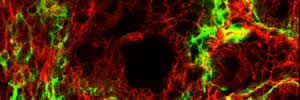03/12/2015
The importance of mesenchymal cells in inflammation and/or neoplastic transformation is well recognized, but their role in the initiation of these processes, particularly in the intestine, remains elusive. In a new study published in the Journal of Experimental Medicine, Koliaraki et al. show that IKKβ in intestinal mesenchymal cells (IMCs) is critically involved in colitis-associated, but not spontaneous tumorigenesis They further demonstrate that IMC-specific IKKβ is involved in the initiation of colitis-associated cancer (CAC), since in its absence mice develop reduced immune cell infiltration, epithelial cell proliferation and dysplasia at the early stages of the disease. Ex-vivo IKKβ-deficient IMCs show defective responses to innate immune stimuli such as LPS, as shown by decreased NF-κB signaling and reduced expression of important NF-κB target genes. Taken together, these results reveal a hitherto unknown role of mesenchymal IKKβ in driving inflammation and enabling carcinogenesis in the intestine.
A companion study by Pallangyo et al. shows that deletion of IKKβ by the Col1a2CreER promoter in intestinal fibroblasts leads to increased colitis-induced tumorigenesis. The two studies suggest that targeting IKKβ in different fibroblast populations by using different promoters might have opposite outcomes in intestinal cancer.
